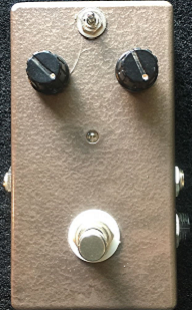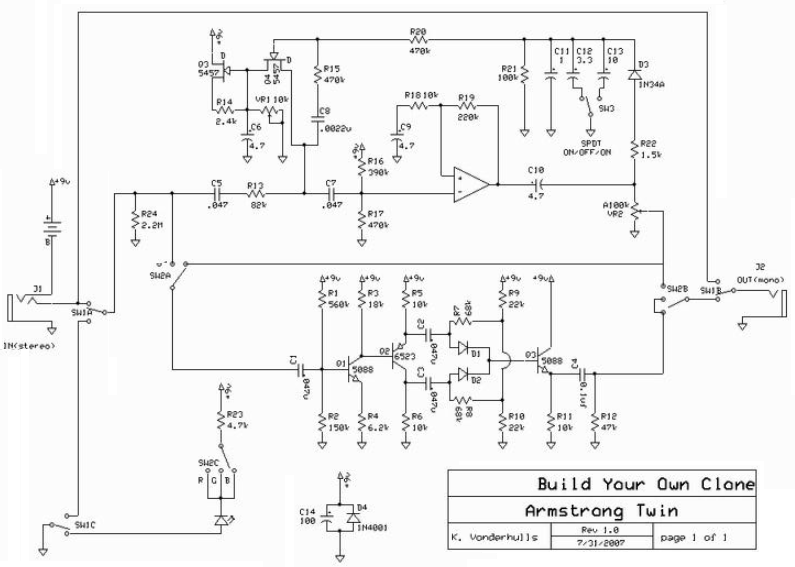Difference between revisions of "Armstrong Twin"
(→Phase Inversion: Mostly Inverted) |
(→Controls) |
||
| Line 12: | Line 12: | ||
== Controls == | == Controls == | ||
| + | [[File:BYOC_ArmstTwin_front.png|right|frame]] | ||
| + | |||
* Switch 1 - '''"Release"''': Compression release selector | * Switch 1 - '''"Release"''': Compression release selector | ||
* Knob 1 - '''"Compressor Squish"''': Potentiometer increases the amount of compression as the knob is turned clockwise. | * Knob 1 - '''"Compressor Squish"''': Potentiometer increases the amount of compression as the knob is turned clockwise. | ||
Revision as of 21:55, 4 June 2018
The BYOC Armstrong Twin, as a pedal, is an homage to Dan Armstrong who created a line of color-coded and labeled effects in the 1970s. The Armstrong Twin combines two of the most popular effects of the Dan Armstrong line:
- The Orange Squeezer (Compressor), and
- The Green Ringer (A sort-of-Octave-sort-of-RingMod sound).
The Orange Squeezer is a fairly popular compressor due to the simplicity of the circuit, the good sound of the circuit, and the ready availability of parts. It has been cloned many times by many people and companies. Unlike other compressors that are valued for their lack of clipping, the Orange Squeezer is known for not being a perfectly clean compressor and this quality, while unacceptable for most other compressors, is considered part of its "charm".
The Green Ringer is a kind-of-octave-kind-of-ring-modulator sounding device that has no controls. It's either on or it's off. It's an interesting sounding device with the effect most prominent, like an octave fuzz, when notes around the 12th fret are played.
Controls
- Switch 1 - "Release": Compression release selector
- Knob 1 - "Compressor Squish": Potentiometer increases the amount of compression as the knob is turned clockwise.
- Knob 2 - "Function": Switches between the three pedal functions:
- Mode 1 - Orange Squeezer Compressor only
- Mode 2 - Green Ringer Octave only
- Mode 3 - Orange Squeezer and Green Ringer combined together
- Footswitch 1 - "On/Off": This switch toggles the Armstrong Twin pedal on and off.
The Compression Release is a three-way switch at the very top of the pedal that toggles the release of the Compressor envelope function between Slow, Fast, and Medium.
Bypass:True
BYOC makes all their pedals true bypass. The Armstrong Twin being no different, is true bypass.
General Information
http://byocelectronics.com/atinstructions.pdf
This pedal is no longer available from BYOC. While we think it's a cool implementation, apparently it did not sell well enough for BYOC to keep it as an ongoing product offering. In fact, when we contacted BYOC, we were only able to get one of the last PCBs, as all the kits has already been sold out. Like the other PCBs we've purchased (like from Fuzzdog), we had to source the parts and the enclosure to complete the pedal.
If you're looking to create your own, you'll likely have to source an Orange Squeezer PCB and a Green Ringer PCB and then combine them into a single enclosure. However, the upside of this is that you'd be able to put in a switch to select the order that you'd like the effects placed.
Phase Inversion: Mostly Inverted
From our examination of the schematic below, three things stand out:
- Each pedal "half" or "color" inverts phase.
- The Orange Squeezer runs in series into the Green Ringer.
- The numbering for the active devices is askew - with "Q3" listed for both the Orange Squeezer and the Green Ringer portions of the schematic. We've grouped them together in an effort to make the schematic easier to read.
There's something else to note, but we clarify below...
Orange Squeezer
| Schematic ID | Electronic Part | Action | Phase State |
|---|---|---|---|
| Q3 | 2N5457 | Compressor Envelope | N/A |
| Q4 | 2N5457 | Compressor Trigger | N/A |
| IC1a | JRC4558 | Inverts | Inverted |
If you look at the schematic, you'll notice that the signal flow to the 2N5457 transistors is one-way - the flow goes to ground. This is how this device becomes a compressor. The signal hits Q4 first, with Q4 acting as an electronic switch. It's the compressor "trigger". Once signal hits this, it opens up the flow to the next transistor, Q3, which regulates the flow to ground, thereby establishing the compressor envelope.
Green Ringer
| Schematic ID | Electronic Part | Action | Phase State |
|---|---|---|---|
| Q1 | 2N5089* | Inverts | Inverted |
| Q2 | 2N6523 | Both Inverted and Original signal | "The Magic" |
| Q3 | 2N5089* | Does not Invert | Inverted |
(*) While the schematic calls for a 2N5088, we use a 2N5089 for lower noise and higher gain.
Again, studying the schematic, the most important thing to note is the Q2, or the 2N6523 transistor. Notice that the signal goes through both the emitter and collector. The emitter portion of the transistor inverts the phase of the signal. The collector maintains the original phase. When recombined, after all phase cancellation is taken into account, here we see "The Magic" of the 2N6523 creating the "green ringer" octave/ringmod sound.
"Mostly" Inverted?
If you take a signal and invert the phase, and then invert is again, you get the original phase. So if you use only one half of the Armstrong Twin, you'll invert phase. If you use both, you'll invert phase, and then invert it back again, getting original phase.
Good Luck!
Pedal Manual
As of this time, BYOC has not issued a separate manual on how to use the pedal. The best reference is either this wiki page, or the instruction manual (linked above in General Information) at Buildyourownclone.com which describes the architecture of, and how to build the pedal.
Schematic
Artists
We are currently unaware of any artists actively using the pedal now, or who have in the past.
- Additional Sources

